
- Food4Thought
- June 27, 2024
- Microsoft Team Meeting
Food4Thought: Knowledge for Action - Silos to Solutions, Lessons from the World Bank
The IFAD Knowledge team is extremely grateful for those who attended and contributed to the IFAD Food4Thought event “Knowledge for Action: Silos to Solutions, Lessons from the World Bank”.
For those who missed it, the video of the event can be viewed here, and attached is the presentation delivered during the event.
Please note that our esteemed speakers are also co-authors and editors of the book “Communities of Practice at the World Bank”.
For IFAD colleagues, if you are interested in reading the book, kindly reach out to the IFAD library colleagues at: library-reference@ifad.org
The event centered on fostering initiatives like “Knowledge Silo Breakers,” aimed at enhancing collaboration and innovation across IFAD. These initiatives empower communities to independently manage knowledge, thereby increasing agility and responsiveness. Additionally, the event emphasized the significant role of leadership in cultivating a culture of knowledge citizenship through targeted initiatives that incentivize and recognize staff contributions for effective knowledge management.
Some highlights for your convenience:
- IFAD emphasizes using knowledge, evidence, and data to drive policy engagement at the country level, particularly as IFAD’s operations have become more decentralized, with country directors advocating for knowledge-driven approaches.
- IFAD integrates diverse types of knowledge (experience-based, evidence-based, data-informed, Indigenous, informal, and experiential) into their operations, enriching their understanding and decision-making processes.
- Knowledge and knowledge management have been central to IFAD’s impact delivery, especially in the context of AI and GenAI. Generating inferences to correct biases in data or AI algorithms has become crucial.
- Communities of practice, called “Knowledge Silo Breakers” at the World Bank, played a key role in breaking down internal silos and promoting knowledge flow across organizational divisions. These communities, with varied structures, fostered organic growth and collaboration, encouraging staff to challenge traditional boundaries and embrace innovation, thereby creating a “rebel culture” that empowered individuals to drive change.
- By empowering communities to manage their knowledge independently at the World Bank, there was a heightened sense of ownership and urgency among members to preserve and share critical insights and solutions. This decentralized approach aimed to make knowledge management more agile and responsive to organizational needs.
- Leadership needs to emphasize that critical knowledge often comes from country offices, where staff directly interact with stakeholders. Valuable insights primarily originate from field operations.
- Leadership plays a crucial role in promoting a culture of knowledge citizenship by consistently emphasizing the importance of knowledge in daily interactions, speeches, and discussions. This approach aims to engage all staff in knowledge management initiatives, recognizing that full adoption may take time. Therefore, smaller, focused initiatives—called islands of knowledge citizenship—should include incentives, recognition, and celebrations.
- The World Bank’s help desks emphasize customization to meet specific sector needs, moving away from one-size-fits-all solutions. Each help desk provides networked support, centralizing and effectively managing queries. This approach draws on broad expertise to offer comprehensive responses, compiling relevant documents, projects, and contacts. It not only addresses immediate needs but also builds a reusable knowledge repository, nurturing knowledge across communities.
Featured Events
1st Virtual Meeting of KM4Impact for 2025
February 19, 2025
See detailsLearn KM with us #17 UNICEF Session
June 27, 2024
See details


